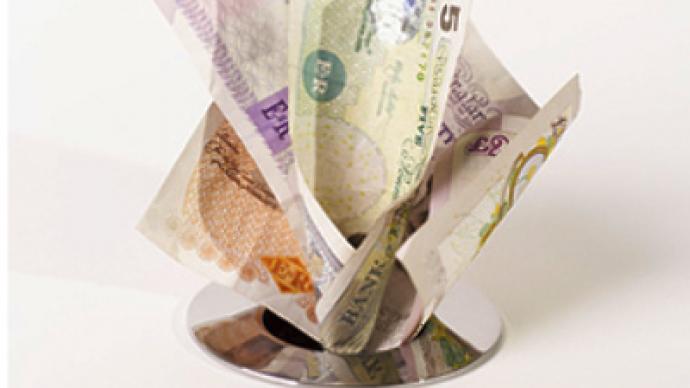Britain wont default because it is simply too big to do so

After the British Government has unveiled Bank Bailout 2 last week, theres a surprising amount of comment suggesting Britain could face a default.
It isn’t a good time to be thinking about the British economy. No matter which way you look at it, its in deep trouble. Fridays release of 4Q 2008 GDP data showing a slide of 1.5%, on top of a 0.6% fall in 3Q means that it is now officially in recession. Its banks are either being nationalized or are getting so much support from the Government that many are saying that nationalization is the next logical step. Unemployment is rising sharply towards the 2 million mark, consumer spending is declining, being outdistanced on the way south only by plummeting house prices. To top it all off the Pound Sterling is setting off in pursuit of the Zimbabwean dollar – if the worst case scenario is to be believed.
The doomsayers are having a field day. Recent press coverage is descriptive of what an analyst would call ‘negative sentiment.’ There is respected investor, Jim Rogers, advising people to “sell any Sterling you might have. It’s finished” while noting Britain’s lack of commodities (apart from diminishing oil) and highlighting possibilities for mass education in Chinese and wholesale population movements east. From the opposition benches we have David Cameron highlighting the possible need for an IMF bailout, reams of paper fleshing out the ugliness, and as a nice once in a lifetime touch, we have Bank of England Governor, Mervyn King, talking about the need to ‘protect the economy from the banks.’
But the most alarmist line of thought runs along the lines of Britain’s government now potentially taking on so much bad debt, that it is running the risk of triggering a default. Britain’s coffers have been massively expanded in recent months. There is this weeks announcement of a £100 billion outlay, to beef up October’s £37 billion plan and November’s £20 billion stimulus package. That comes with October’s £250 billion program to back bank bonds, and the Bank of England’s £50 billion fund for purchasing assets. That’s on top of all the other Government expenditures.
Then there’s the British Banks. They have foreign liabilities estimated at $4.4 trillion which the British Government, backed by $61 Billion of foreign reserves, would ultimately be responsible for if it were to nationalize them. Or, if you like, about 440% of GDP. The prospect of this, in part, has Credit Default Swaps measuring British debt at an all time high of 125 basis points. The magnitude of this prospect has some suggesting the possibility of the Government simply walking away from them, and allowing, as the Iceland Government has with its ill fated banks, them to default.
A problem with this line of reasoning – apart from the numbers which I will come to – is that Britain isn’t Iceland, and the British debts are of such a magnitude that defaulting would create more problems than it would solve.
For starters London is one of the worlds preeminent capital centres, and it hasn’t become this overnight. It has been the result of generations of finely honing the services available to the needs of capital management, resulting in a culture which much of the rest of the world values insofar as it is to London, inter alia, that it looks when thinking of money management. Not just the money management itself, but the laws, the education, the systems, and the culture and expectations of people taking part in the process. This is very big business, and generates considerable wealth for Britain, with attendant spinoffs for British society. A default would throw this out the window.
The other disturbing thought relating to any British default would be what on earth the rest of the financial world would do the day after. The debts with British banks would be roughly 8 times the size of those which went down with Lehman Brothers, and sent markets into such a plunge last year. It is in nobody’s interest to go there – not creditors, not Britain, not the global financial system. If Britain were to take that route, then why wouldn’t others mull the possibility, and then we start to move into the realms of the mother of all financial collapses, towing along the mother of all global economic collapses. Do creditors start nationalizing assets as a response? Do they start adopting some form of autarky to bring all risk closer to home? Does trade as we know it go out the window?
If we step away from the doomsday scenario and come back to the numbers on the plate, then it is obvious that there is a lot of work to be done, no doubt involving considerable pain for the British economy. Goldman Sachs has recently published data indicating that the cost of the bailouts and economic stimulus is likely to come to about 8% of GDP. It isn’t pretty, but neither is it unmanageable. And then theres the $4.4 trillion. Sure, that is the total amount of debt in British banks – all British Banks, those foreign owned (by the EU, U.S. and Japan included), those British owned. The sum for British owned banks comes back to about £1.5 Trillion which is actually backed by about the same in assets, notwithstanding murkiness about valuations which currently pervades all banking asset estimates (whether British or not), and compares for example with Switzerland where bank liabilities are roughly 2.5 times GDP. Another more positive set of numbers on the UK is Public Sector debt, which currently is about 50% of national income and less than the EU average.
That Britain has a difficult road ahead of it hardly makes it Robinson Crusoe amongst global economies – whether major or not. In this day and age, where economies are more interconnected than they have ever been, to talk of one major piece of the global financial system defaulting simply obscures the task ahead of Britain, not to mention almost every other player in the global economy.
James Blake, RT













